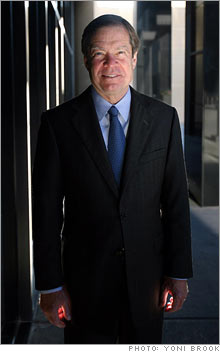|
The gusher paradox A new oil discovery is great for the drillers - but may be bad for us.
(Fortune Magazine) -- The recent discovery of a massive oilfield under the Gulf of Mexico appears to be a godsend for our crude-hungry country. It's not that simple, however. The new deep-water find is a pointed example of the way elevated oil and gas prices always seem to lead us to new technologies and, eventually, to renewed supplies. But one giant new gusher does nothing to get us off the gerbil wheel of ever more consumption creating ever more demand. In case you missed it, in early September a consortium of Chevron (Charts), Devon Energy (Charts), and Norway's Statoil announced it had struck oil at the Jack No. 2 well, some 170 miles southwest of New Orleans and 29,000 feet down through water and earth. Geologists estimate that the area contains anywhere from three billion to 15 billion barrels.
If the find comes in at the upper end of that range - and of course the oil whisperers believe that will be the case - it will be the largest U.S. oilfield. (Alaska's Prudhoe Bay, where BP (Charts) recently had some pipeline problems, is currently the biggest, with some 12 billion barrels produced.) The deposits could increase U.S. reserves, now at about 29 billion barrels, by 50%. No wonder the strike added to the downward momentum on oil prices: Since peaking at $77 in mid-July, the cost of a barrel of crude has fallen below $64. The massive find could boost Devon Energy If you're looking for a market winner in this news, the best bet is the smallest member of the exploration group, Devon. With a market cap of nearly $30 billion, the Oklahoma driller is hardly a pipsqueak. But it's no $137 billion behemoth like Chevron either. (Devon owns 25% of the Jack project, Statoil has another 25%, and Chevron has 50%.) The "Jack prospect" appears to validate the aggressive growth strategy of Devon's chairman, CEO, and co-founder J. Larry Nichols. For 35 years, he has focused on opportunistic acquisitions and ambitious drilling projects in the Gulf of Mexico. "We're smiling, but we aren't celebrating yet," Nichols, 64, told me the other day. "We still need to spend a considerable sum of money and solve some technological issues. It will take years." Nichols couldn't even begin to tell me what the cost per barrel would be, but he insists that the project will be viable. Before you go gaga for Devon, though, consider this: Yes, after spiking to an all-time high on the news, the stock has now fallen six bucks to $66. But it's up more than threefold over the past five years. And then there's the real question: Just how big is the field? "Of course this discovery was great news for Devon," says Fadel Gheit, veteran Oppenheimer oil analyst. "But all we know now is that Devon has a fish on the line. Is it 500 pounds or five pounds? It's too early to tell." New technology drills deeper Just finding the oil represents a major technological breakthrough. More than five miles below the surface of the gulf, the wells will be the deepest on earth. Less than a decade ago this oil would have been considered untouchable. But in 2000, new-generation drill ships were launched that allow for exploration in water up to 10,000 feet deep. And the seismic technology that penetrates the thick salt layer that covers this section of the gulf oilfields is also brand-new. "Before that technology you'd just have been drilling blind," says Nichols. I happen to be reading Matthew Simmons's Twilight in the Desert, which describes how Saudi Arabia in particular and the world in general are running out of oil. This "peak theory" of oil (as in, the world has achieved peak production) would seem to be off base with the discovery of a 15 billion-barrel oilfield. And, as Nichols points out, oil alarmists have been sounding the same bell for decades. But I'm not sure that we should be so quick to dismiss the peakists. At some point they will be right, and I believe it's important to act as if they already are. Pursuing petroleum at any cost overseas, and even domestically, exposes us to all sorts of risk and merely makes it easier to avoid the tough steps that could reduce our dependence on oil. So congrats to Larry Nichols and his partners. I hope they get 15 billion barrels out of the gulf and more. But I'll be even more fired up when some engineer builds me an SUV that gets 100 miles to the gallon. Watch Andy Serwer on CNN's American Morning and In the Money. You can also read the latest Fortune stories on your handheld device CNNMoney.mobi. |
|

